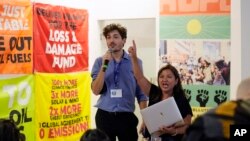Tensions sparked by the Israel-Hamas war are spilling into the climate conference in Dubai, with calls for a cease-fire in Gaza competing for attention with demands for climate justice at COP28.
Demonstrators from several groups gathered on Sunday to show solidarity with Palestinians in Gaza, where thousands have died in an Israeli military offensive intended to destroy the U.S.-designated terror group Hamas.
The offensive was prompted by Hamas' October 7 raid into Israel in which some 1,200 people were massacred and about 240 were taken back to Gaza as hostages.
"Free Palestine!" demonstrators chanted during the weekend rally, with many saying the pursuit of climate justice was not possible while the war continued. Several world leaders have also criticized the Israeli actions during remarks to the climate gathering.
Pressing issue for Palestine
Human-caused climate change is a pressing issue for the Palestinian delegation at COP28.
The Palestinians live in one of the world's most vulnerable places despite causing less than 0.01% of global emissions. Their territories have suffered from water scarcity, rising temperatures and soil degradation for years.
The main source of emissions in the Palestinian territories has been the burning of fossil fuels. There's only one power plant in Gaza, and most power to the enclave was supplied by Israel before the war started.
The Palestinian Authority, which governs the West Bank but not Gaza, pledged in 2021 to reduce emissions by 26.6% by 2040. Nevertheless, Palestinian delegates at COP28 told VOA the pursuit of climate justice cannot take precedence over human lives.
World leaders "said that we should take care of gender and the earth, and we should take care with the climate refugees. But if you reflect this in Gaza, it's not the story," said Ahmed Abuthaher, director general of the Palestinians' Environment Quality Authority.
"People without water, people without housing, people without medical relief, people lose everything. So how come to make resilience? So, my message to all of them (is) that climate change is good to combat it, but it is not more important than our lives. So first comes human lives."
Some climate activists are expressing a similar sentiment.
"There can't be climate justice when thousands are being killed," said Hendrik Voss, digital coordinator from the Climate Justice Alliance – a U.S.-based organization focusing on ways that climate change can be addressed that are fair to all countries.
"The Palestinian people on the frontlines of genocidal warfare are on everyone's mind here at COP28," said Voss. "CJA participated in yesterday's protest to make our position known."
But Gideon Behar, special envoy on climate change and sustainability with the Israeli delegation, argued that the issues are not connected.
"We have to separate between the issues of climate and geopolitical issues," he told VOA. "If we do not do that, the whole international climate negotiations will be kidnapped by geopolitical issues."
Report says occupation hurt adaptation efforts
A document published under the auspices of the U.N. Framework Convention on Climate Change makes a case that Israel's decades-long occupation of the West Bank and blockade of Gaza have hampered climate adaptation efforts, and Palestinian delegates in Dubai said the war has made those efforts even more challenging.
Hadeel Ikhmais, who heads the climate change section at the Environment Quality Authority for the Palestinian territories, said the territories will need to adapt to climate change no less urgently that the rest of the world.
But, she noted in an interview, the territories have no water sources other than wells and aquifers and must buy a substantial part of their water from Israel at rates that strain their limited budgets.
Israel's Behar countered that it was Hamas' own actions that led to water instability in Gaza. Many Israelis blame Hamas and its repeated acts of aggression for the Israeli blockade that prevents many goods, including spare parts, and services from entering the enclave. Still, Behar said people there have benefited from Israel's infrastructure. "We are helping people in Gaza for years by supplying electricity and water," Behar said.
Some activists at COP28 say the war in Gaza should not be allowed to dominate the climate negotiations because climate change itself will be the cause of future conflicts around the world.
"The entire purpose of COP is to come together as a global community and work together to develop adaptation and mitigation measures," said Matthew Mairinger, president of North American Young Generation in Nuclear, a North Carolina-based nuclear-friendly group.
"Therefore, it is crucial to continue to host these meetings and negotiations even during times of war," he said. "We face a global problem, and we need to come together with a global solution."
This article was prepared with the support of a COP28 Climate Justice Fellowship by Climate Tracker.




